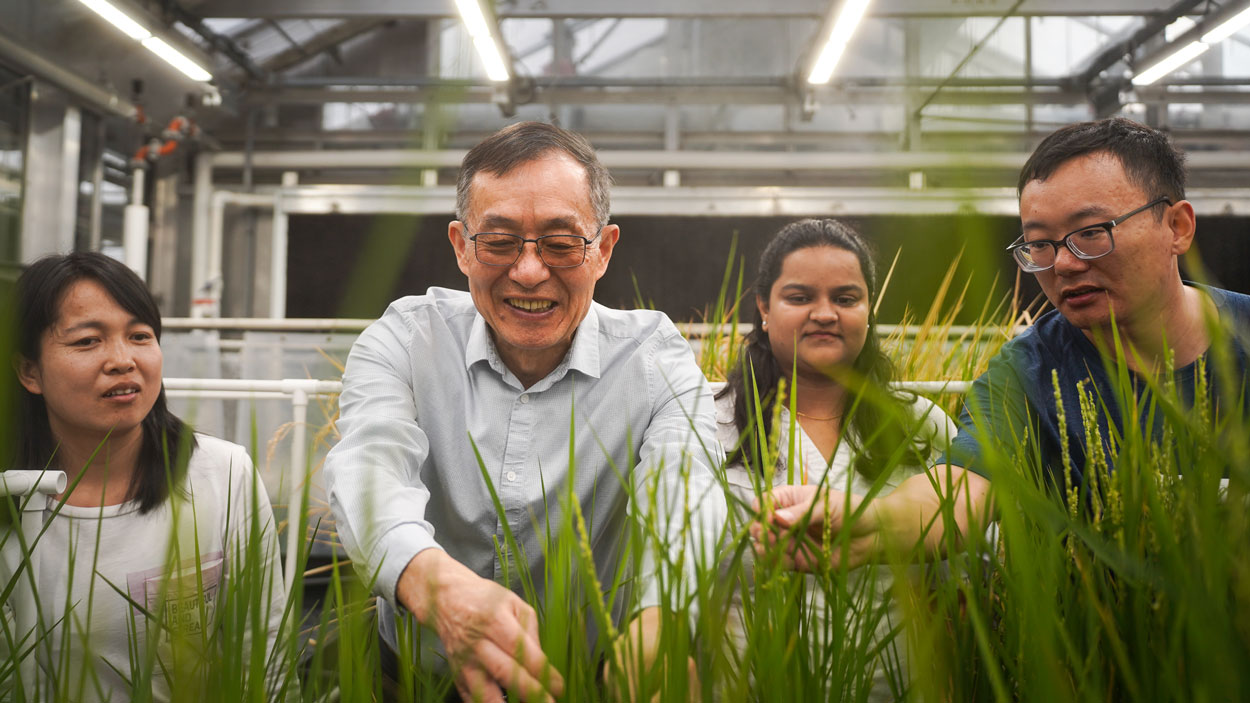
Xuemin “Sam” Wang (second from left), the E. Desmond Lee Endowed Professor in Plant Sciences, was chosen as the 2024 recipient of the Terry Galliard Medal from the International Symposium on Plant Lipids. He’ll receive the medal at the biennial symposium in July in Lincoln, Nebraska. (Photo by Patrick Bowey/Donald Danforth Plant Science Center)
Xuemin “Sam” Wang has built a decorated career spanning more than three decades as a plant biologist.
The E. Desmond Lee Endowed Professor in Plant Sciences at the University of Missouri–St. Louis was honored in 2014 with the Chancellor’s Award for Excellence in Research and Creativity, and three years later he received a Distinguished Alumni Award from his alma mater, the University of Kentucky’s Department of Plant and Soil Sciences. In 2018, the Academy of Science of St. Louis presented him with the George Engelmann Interdisciplinary Award for extensive work surrounding plant lipids.
Though he’s no stranger to accolades, Wang couldn’t help feeling an extra sense of accomplishment earlier this month when he learned he’d been selected to receive the 2024 Terry Galliard Medal at the biennial International Symposium on Plant Lipids. The symposium is scheduled for July 14-19 at the University of Nebraska–Lincoln.
“It’s fair to say this is the most prestigious award given by the international plant lipid research community,” Wang said. “It means a lot because this is what we do. Whatever profession you’re in, you want your work to be appreciated and recognized by your peers and colleagues. It’s a special honor.
“This award is a recognition of my former and current students, postdocs, researchers and collaborators for their excellent work and contributions to the field. It brings me special joy and pride to work with talented students and colleagues and carry out internationally recognized research.”
The award was established in 1994 to honor the late Terry Galliard, who 20 years earlier organized the first ISPL conference in Norwich, United Kingdom. It is meant to recognize the career achievements of a distinguished plant lipid scientist.
Wang’s name will be added to a list of researchers hailing from Canada, Japan, Germany, Sweden, the United Kingdom and the United States who have received the prize.
“They are all highly distinguished lipid scientists,” he said. “I’m very honored to be part of that group.”
Wang found his way into their company almost by accident. After earning his bachelor’s degree from Huazhong Agricultural University in his native China in 1982, Wang came to the United States to pursue a master’s degree at The Ohio State University. He then moved to a PhD program at Kentucky.
He intended to focus his work on genetic engineering, but the professor he planned to study under moved into an administrative role. Instead, Wang wound up working in the lab of a junior faculty member, who introduced him to lipids, the fatty compounds that serve as major energy stores and building blocks of biological membranes.
Wang was quickly hooked.
Plant lipids include vegetable oils important as nutritional sources for humans and animals and in the development of renewable industrial feedstock and biofuels, including biodiesel. They also are used as a compact energy source for seed germination and have a myriad of functions in the cell.
“Lipids are a huge field,” Wang said. “We humans have a love-hate relationship with lipids. We rely on them to provide us some nutrients and also industrial materials, and there are all kinds of resources, and of course, the health and other benefits. So, it’s a big, very important area.”
Wang pursued a postdoctoral fellowship at Louisiana State University from 1988 to 1991, before joining the faculty in the Department of Biochemistry at Kansas State University. Wang served 13 years at the university, earning tenure, rose to the rank of professor, and in his last two years became the director of the Kansas Lipidomics Research Center.
Wang joined the faculty in UMSL’s Department of Biology as the E. Desmond Lee Endowed Professor in Plant Sciences in 2004, and the position came with a dual appointment as a principal investigator at the Donald Danforth Plant Science Center.
Wang’s research has focused on lipid metabolism, vegetable oil production, and lipid signaling in plant response to environmental stress, such as drought and N/P use efficiency, among other topics, and he has authored more than 200 peer-reviewed articles in scientific journals.
Over the past three years, Wang has received a grant from the National Institutes of Health to study the molecular connections linking circadian rhythms and lipid metabolism in plants and two grants from the National Science Foundation to investigate the role of lipids in cereal crop haploid seed production and reproductive architecture. His work has also been supported by funding from the U.S. Department of Agriculture and the Department of Energy.
As the recipient of the Galliard Medal, Wang is slated to give a lecture highlighting his work during an ISPL session on July 17 in Lincoln, Nebraska.
“I’ll talk about some of the things we’re most specialized in or best known for,” Wang said, “like plant phospholipases and lipid regulation of plant growth and stress responses.”














